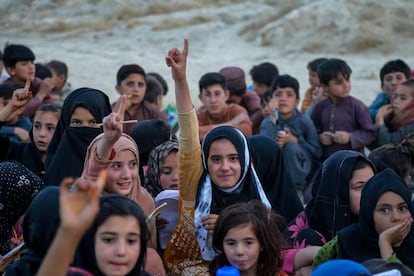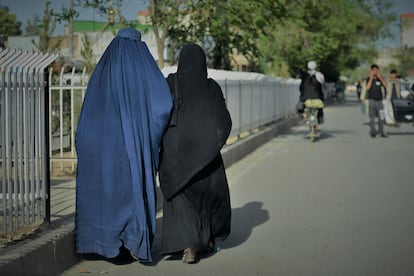Child weddings on the rise in Afghanistan: ‘Girls are getting married younger and younger, at 11 and 12′
Taliban restrictions and poverty are causing a mental health crisis, with families feeling increasingly forced to marry off their daughters to make ends meet, or to prevent them being forced to wed extremists


Girls forcibly turned into brides, in increasingly larger numbers, younger, and more and more psychologically affected. The restrictions imposed on women by the Taliban — particularly the ban on their continued education after the age of 12 — combined with the economic crisis in Afghanistan have led to an increase in child marriages. There has also been a notable increase in cities, where this tradition had been on the decline over the past 20 years. It is impossible to cite exact figures, but 70% of the more than 3,000 young women interviewed by the local organization Bishnaw-Wawra in August know girls who have been forced to marry aged under 18.
“There is a clear link between the return of the Taliban in 2021 and the increase in child marriage, especially in urban centers, where, since two decades ago, there had been an evolution and families no longer felt they had to marry off their daughters as soon as possible, because girls were getting opportunities to work and study and were also contributing financially to the household,” Mariam Safi, director of The Organization for Policy Research and Development Studies (DROPS), created in Kabul in 2014 to strengthen the values of inclusion and pluralism in Afghan society, and of which Bishnaw-Wawra is a member, tells EL PAÍS.
Bishnaw-Wawra’s work provides an insight into what is happening inside the homes and in the villages of Afghanistan, where for the past two years conducting surveys has been an arduous mission, especially if the objective is for women’s opinions to be heard. In August 2023, this organization managed to interview 3,840 Afghan women face-to-face, by video conference and in focus groups. The vast majority were aged under 35 and, to make the sample as representative as possible, they came from 23 different Afghan provinces and from both rural and urban settings.
“The Taliban prohibit young women from working in most sectors, studying, and moving around the city alone, and many families are once again feeling the burden and urgency to marry off their daughters as soon as possible. That is why we are seeing girls getting married younger and younger, at 11 and 12 years of age,” explains Safi.
She notes that in women’s discussion forums, the tone about what women suffer and see around them is even more stark, and the data is alarming. “Families feel very insecure when their daughters start to reach an age and have no husband. The Taliban harass them and the parents become afraid that a Taliban will take their daughter to make her his wife. So, they prefer to marry them off to anyone first,” she adds.
“Yesterday, a 13-year-old girl was forced to marry a 45-year-old man. The family received 250,000 Afghanis [$3,160],” said a young Afghan girl in one such discussion group in September. “The family decides on the girl’s marriage when they are very young, mostly out of fear of the Taliban and poverty,” said another.

“The vacuum is back, there is no protection”
Fawzia Koofi, a former Afghan parliamentarian known for her advocacy for women’s rights, and one of the politicians involved in peace talks with the Taliban before 2021, recalls that child marriage has been a common practice in the country but over the last 20 years it had been possible to “protect women with institutions, laws and with a female presence in positions of power. A Ministry for Women’s Affairs was created, a law against violence was drafted... but now the vacuum is back, there is no protection. Families see no future or hope for their daughters and marry them off. They are children, they don’t even know what’s going on,” she says in an interview with EL PAÍS.
“On average, about one in three girls is married before the age of 18 and in some provinces, where the practice has always been more widespread, one in two girls is married before the age of 18,” notes Fran Equiza, UNICEF representative in Afghanistan, based on the findings of the U.N. organization’s Multiple Indicator Cluster Survey 2022-23.
In Afghanistan, the law states that women can marry from the age of 16. When Bishnaw-Wawra asked respondents at what age girls in their village or community are getting married, 15% said brides are under 15 years and 54% said they are between 18 and 25. When questioned about the age they consider appropriate for marriage, more than 70% said between 18 and 25. And when asked how the community reacts if a family is slow to marry off a daughter, 25% responded that the clan is viewed negatively and 21% added that the girl is seen as a burden to those close to her.
Another factor driving child marriage is increasing poverty, which forces families to sell their “four- or five-year-old” daughters because they cannot afford all the children they have, according to Safi. These girls are at a very high risk of ending up married as soon as they reach puberty. “There is also a kind of dowry market; the earlier you bargain for your daughter, the better dowry you can get,” she adds.
“In Afghanistan, the burden of poverty falls mostly on girls as child marriage persists, especially among poor families, who are often forced to trade their daughters for dowries to alleviate their economic hardship,” says UNICEF’s Equiza. According to the World Food Program, 15 million people out of a total population of 43 million depend on humanitarian assistance for food.
No solution can be sustained over time if the people of Afghanistan are not guaranteed their rights, and women are demanding only their fundamental rightsMariam Safi, Bishnaw-Wawra
Dead bodies in the river
Bishnaw-Wawra, which in the Dari and Pashto dialects means “listen,” began collecting women’s opinions in 2020, in order to convey them to the team negotiating a peace agreement for Afghanistan in Doha. Around the table were members of the government and the Taliban, as well as some women such as Koofi, who asked for more details on what the priorities and demands for Afghan women were. After the return of the Taliban, they continued working to send their findings to the U.N., the European Union and other countries involved in Afghanistan’s. In total, they have interviewed some 30,000 women on different topics.
“We continue to publish this data so that when the international community makes decisions about humanitarian aid, relations with the Taliban or possible recognition of their regime, they take into account what the people are saying, what women want. Because no solution can be sustained over time if the people of Afghanistan are not guaranteed their rights, and women are demanding only their fundamental rights,” Safi stresses.
Surveys conducted by Bishnaw-Wawra see a clear link between these forced unions and the deteriorating mental health of young women, among whom depression and suicide are on the rise. In March, the institution conducted a survey on this subject in 18 provinces and “67% of the more than 2,000 interviewed said they knew girls who were suffering from some kind of mental problem, especially depression and anxiety. In addition, 164 of those interviewed said they knew another woman who had attempted suicide. And we are talking about a small survey; let’s imagine the real number,” Safi says.
According to that study, the lack of freedom of movement and the prohibition on studying and working, with the exception of a few sectors such as health, are the decisions that have most affected the mental health of Afghan women. “But we will never know the magnitude of what is happening. I am told that in my province, Badakhshan, bodies of girls who have committed suicide are appearing in the river,” Koofi says.
For Koofi — who from exile advocates for the rights of Afghan girls — education remains the most powerful weapon. “It is the only hope,” she insists. The former parliamentarian now manages, from a distance, a center where 200 girls between the ages of 14 and 18 study clandestinely. Without diplomas, with hardly any resources and with a lot of fear, in her own words. “We feel that for the world Afghanistan is an old story, but for us, it is an open wound. We need countries to take in these girls and help them go to university. Because in four years, when they finish their studies, they will be able to help others, and who knows? Maybe then something will have changed in Afghanistan,” she says.
Safi denounces what she sees as the hypocrisy of the international community, “which contradicts its own values” by its inaction in Afghanistan. But she is also pragmatic. “A situation is being created in which the Taliban will gradually become an internationally recognized regime. Good for them. They’re here and they’re going to stay, but at least let the world use its power to get them to remove restrictions against women. Because then, for better or worse, they will be able to live their lives and will not be imprisoned in their homes.”
Sign up for our weekly newsletter to get more English-language news coverage from EL PAÍS USA Edition
Tu suscripción se está usando en otro dispositivo
¿Quieres añadir otro usuario a tu suscripción?
Si continúas leyendo en este dispositivo, no se podrá leer en el otro.
FlechaTu suscripción se está usando en otro dispositivo y solo puedes acceder a EL PAÍS desde un dispositivo a la vez.
Si quieres compartir tu cuenta, cambia tu suscripción a la modalidad Premium, así podrás añadir otro usuario. Cada uno accederá con su propia cuenta de email, lo que os permitirá personalizar vuestra experiencia en EL PAÍS.
¿Tienes una suscripción de empresa? Accede aquí para contratar más cuentas.
En el caso de no saber quién está usando tu cuenta, te recomendamos cambiar tu contraseña aquí.
Si decides continuar compartiendo tu cuenta, este mensaje se mostrará en tu dispositivo y en el de la otra persona que está usando tu cuenta de forma indefinida, afectando a tu experiencia de lectura. Puedes consultar aquí los términos y condiciones de la suscripción digital.








































